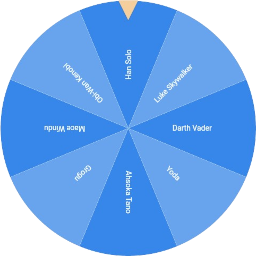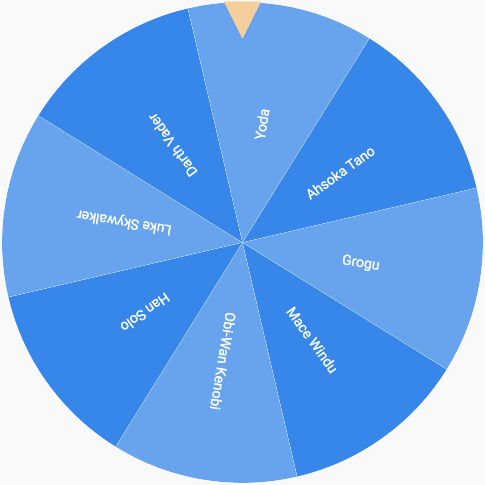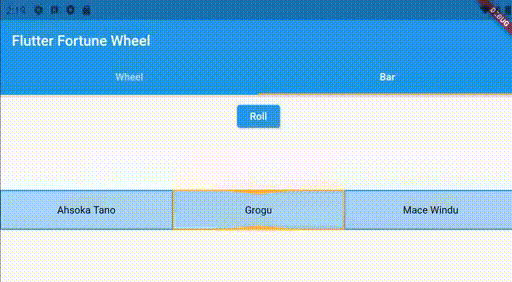https://github.com/kevlatus/flutter_fortune_wheel
Visualize random selections with Flutter widgets like the wheel of fortune.
https://github.com/kevlatus/flutter_fortune_wheel
flutter fortune random visualization
Last synced: 5 months ago
JSON representation
Visualize random selections with Flutter widgets like the wheel of fortune.
- Host: GitHub
- URL: https://github.com/kevlatus/flutter_fortune_wheel
- Owner: kevlatus
- License: mit
- Created: 2020-07-06T17:46:03.000Z (over 5 years ago)
- Default Branch: main
- Last Pushed: 2024-10-20T16:22:40.000Z (12 months ago)
- Last Synced: 2025-05-10T08:38:36.547Z (5 months ago)
- Topics: flutter, fortune, random, visualization
- Language: Dart
- Homepage: https://kevlatus.github.io/flutter_fortune_wheel
- Size: 5.25 MB
- Stars: 161
- Watchers: 4
- Forks: 94
- Open Issues: 16
-
Metadata Files:
- Readme: README.md
- Changelog: CHANGELOG.md
- License: LICENSE
Awesome Lists containing this project
README
[](https://pub.dev/packages/flutter_fortune_wheel)
[](https://coveralls.io/github/kevlatus/flutter_fortune_wheel?branch=main)
# Flutter Fortune Wheel
This Flutter package includes wheel of fortune widgets, which allow you to visualize random selection processes.
They are highly customizable and work across mobile, desktop and the web.

You can learn more about the wheel's implementation [in this article](https://www.kevlatus.de/blog/making-of-flutter-fortune-wheel)
and try an [interactive demo here](https://kevlatus.github.io/flutter_fortune_wheel).
## Quick Start
First install the package via [pub.dev](https://pub.dev/packages/flutter_fortune_wheel/install).
Then import and use the [FortuneWheel](https://pub.dev/documentation/flutter_fortune_wheel/latest/flutter_fortune_wheel/FortuneWheel-class.html):
```dart
import 'package:flutter/material.dart';
import 'package:flutter_fortune_wheel/flutter_fortune_wheel.dart';
StreamController controller = StreamController();
FortuneWheel(
selected: controller.stream,
items: [
FortuneItem(child: Text('Han Solo')),
FortuneItem(child: Text('Yoda')),
FortuneItem(child: Text('Obi-Wan Kenobi')),
],
)
```
## Examples
The wheel of fortune is the most iconic visualization.

Unfortunately, a circular shape is not the best solution when vertical screen space is scarce. Therefore,
the fortune bar, which is smaller in the vertical direction, is provided as an alternative. See below for an example:

```dart
import 'package:flutter/material.dart';
import 'package:flutter_fortune_wheel/flutter_fortune_wheel.dart';
StreamController controller = StreamController();
FortuneBar(
selected: controller.stream,
items: [
FortuneItem(child: Text('Han Solo')),
FortuneItem(child: Text('Yoda')),
FortuneItem(child: Text('Obi-Wan Kenobi')),
],
)
```
## Customization
### Drag Behavior
By default, the fortune widgets react to touch and drag input. This behavior can be customized using the `physics` property, which expects an implementation
of the [`PanPhysics`](https://pub.dev/documentation/flutter_fortune_wheel/latest/flutter_fortune_wheel/PanPhysics-class.html) class.
If you want to disable dragging, simply pass an instance of [`NoPanPhysics`](https://pub.dev/documentation/flutter_fortune_wheel/latest/flutter_fortune_wheel/NoPanPhysics-class.html).
For the FortuneWheel, [`CircularPanPhysics`](https://pub.dev/documentation/flutter_fortune_wheel/latest/flutter_fortune_wheel/CircularPanPhysics-class.html)
is recommended, while the FortuneBar uses [`DirectionalPanPhysics.horizontal`](https://pub.dev/documentation/flutter_fortune_wheel/latest/flutter_fortune_wheel/DirectionalPanPhysics/DirectionalPanPhysics.horizontal.html)
by default. If none of the available implementations, suit your needs, you can always implement a subclass of [`PanPhysics`](https://pub.dev/documentation/flutter_fortune_wheel/latest/flutter_fortune_wheel/PanPhysics-class.html).
The callback passed to `onFling` is called when the pan physics detects a fling gesture. This gives
you the opportunity to select a new random item.
```dart
StreamController controller = StreamController();
FortuneWheel(
// changing the return animation when the user stops dragging
physics: CircularPanPhysics(
duration: Duration(seconds: 1),
curve: Curves.decelerate,
),
onFling: () {
controller.add(1);
}
selected: controller.stream,
items: [
FortuneItem(child: Text('Han Solo')),
FortuneItem(child: Text('Yoda')),
FortuneItem(child: Text('Obi-Wan Kenobi')),
],
)
```
### Item Styling
FortuneItems can be styled individually using their `style` property. Styling a FortuneWidget's
items according to a common logic is achieved by passing a [`StyleStrategy`](https://pub.dev/documentation/flutter_fortune_wheel/latest/flutter_fortune_wheel/StyleStrategy-class.html).
By default, the FortuneWheel uses the [`AlternatingStyleStrategy`](https://pub.dev/documentation/flutter_fortune_wheel/latest/flutter_fortune_wheel/AlternatingStyleStrategy-class.html)
and the FortuneBar uses the [`UniformStyleStrategy`](https://pub.dev/documentation/flutter_fortune_wheel/latest/flutter_fortune_wheel/UniformStyleStrategy-class.html).
As with drag behavior, you can pass custom implementations to the `styleStrategy` property.
```dart
// styling FortuneItems individually
FortuneWheel(
selected: Stream.value(0),
items: [
FortuneItem(
child: Text('A'),
style: FortuneItemStyle(
color: Colors.red, // <-- custom circle slice fill color
borderColor: Colors.green, // <-- custom circle slice stroke color
borderWidth: 3, // <-- custom circle slice stroke width
),
),
FortuneItem(child: Text('B')),
],
)
// common styling for all items of a FortuneWidget
FortuneBar(
// using alternating item styles on a fortune bar
styleStrategy: AlternatingStyleStrategy(),
selected: Stream.value(0),
items: [
FortuneItem(child: Text('Han Solo')),
FortuneItem(child: Text('Yoda')),
FortuneItem(child: Text('Obi-Wan Kenobi')),
],
)
```
### Indicator Styling
The position indicators can be customized by passing a list of [FortuneIndicators](https://pub.dev/documentation/flutter_fortune_wheel/latest/flutter_fortune_wheel/FortuneIndicator-class.html) to [`FortuneWidget.indicators`](https://pub.dev/documentation/flutter_fortune_wheel/latest/flutter_fortune_wheel/FortuneWidget/indicators.html). By default, the [`FortuneWheel`](https://pub.dev/documentation/flutter_fortune_wheel/latest/flutter_fortune_wheel/FortuneWheel-class.html) uses a [`TriangleIndicator`](https://pub.dev/documentation/flutter_fortune_wheel/latest/flutter_fortune_wheel/TriangleIndicator-class.html) and the [`FortuneBar`](https://pub.dev/documentation/flutter_fortune_wheel/latest/flutter_fortune_wheel/FortuneBar-class.html) uses a [`RectangleIndicator`](https://pub.dev/documentation/flutter_fortune_wheel/latest/flutter_fortune_wheel/RectangleIndicator-class.html). You may either pass styled versions of these existing widgets or create your own implementations, since indicators can be any kind of widget. Here is an example of using a customized indicator:
```dart
FortuneWheel(
selected: Stream.value(0),
indicators: [
FortuneIndicator(
alignment: Alignment.bottomCenter, // <-- changing the position of the indicator
child: TriangleIndicator(
color: Colors.green, // <-- changing the color of the indicator
width: 20.0, // <-- changing the width of the indicator
height: 20.0, // <-- changing the height of the indicator
elevation: 0, // <-- changing the elevation of the indicator
),
),
],
items: [
FortuneItem(child: Text('A'))
FortuneItem(child: Text('B')),
],
)
```
## Contributions
Contributions are much appreciated.
If you have any ideas for alternative visualizations, feel free to
[open a pull request](https://github.com/kevlatus/flutter_fortune_wheel/pulls) or
[raise an issue](https://github.com/kevlatus/flutter_fortune_wheel/issues).
The same holds for any requests regarding existing widgets.